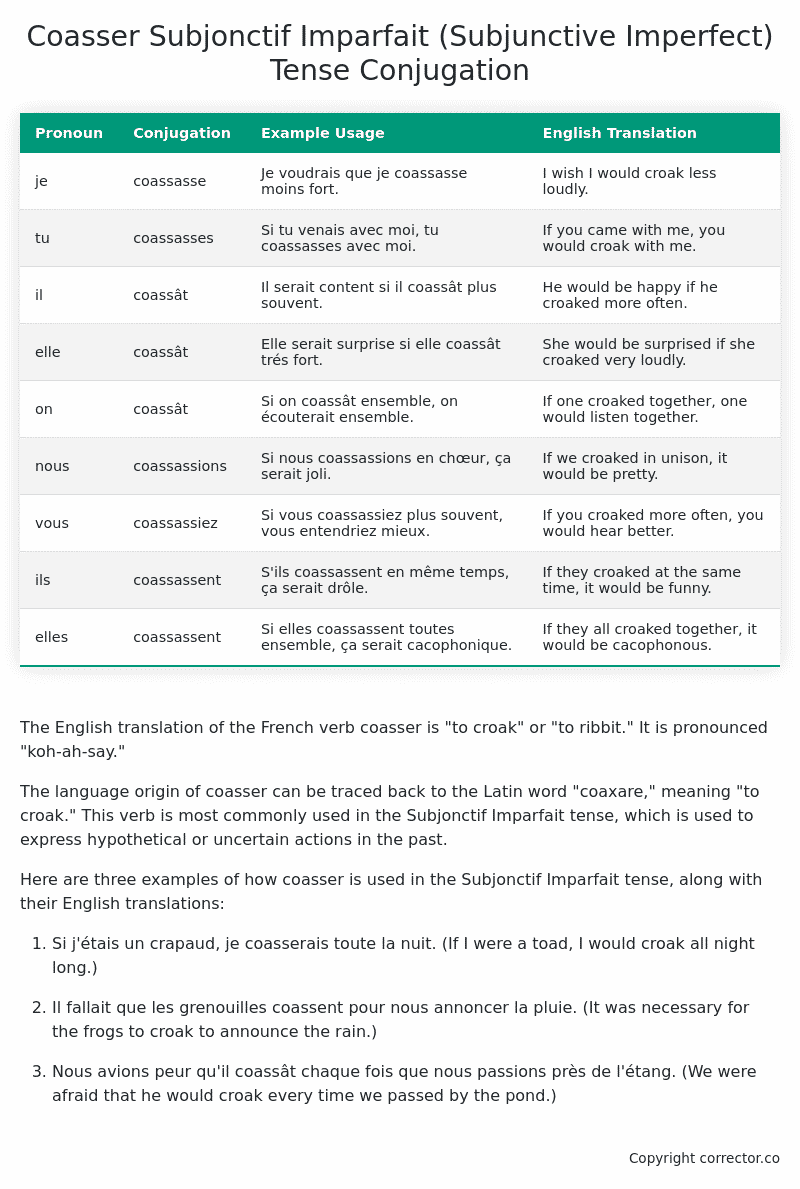Subjonctif Imparfait (Subjunctive Imperfect) Tense Conjugation of the French Verb coasser
Introduction to the verb coasser
The English translation of the French verb coasser is “to croak” or “to ribbit.” It is pronounced “koh-ah-say.”
The language origin of coasser can be traced back to the Latin word “coaxare,” meaning “to croak.” This verb is most commonly used in the Subjonctif Imparfait tense, which is used to express hypothetical or uncertain actions in the past.
Here are three examples of how coasser is used in the Subjonctif Imparfait tense, along with their English translations:
-
Si j’étais un crapaud, je coasserais toute la nuit. (If I were a toad, I would croak all night long.)
-
Il fallait que les grenouilles coassent pour nous annoncer la pluie. (It was necessary for the frogs to croak to announce the rain.)
-
Nous avions peur qu’il coassât chaque fois que nous passions près de l’étang. (We were afraid that he would croak every time we passed by the pond.)
Table of the Subjonctif Imparfait (Subjunctive Imperfect) Tense Conjugation of coasser
| Pronoun | Conjugation | Example Usage | English Translation |
|---|---|---|---|
| je | coassasse | Je voudrais que je coassasse moins fort. | I wish I would croak less loudly. |
| tu | coassasses | Si tu venais avec moi, tu coassasses avec moi. | If you came with me, you would croak with me. |
| il | coassât | Il serait content si il coassât plus souvent. | He would be happy if he croaked more often. |
| elle | coassât | Elle serait surprise si elle coassât trés fort. | She would be surprised if she croaked very loudly. |
| on | coassât | Si on coassât ensemble, on écouterait ensemble. | If one croaked together, one would listen together. |
| nous | coassassions | Si nous coassassions en chœur, ça serait joli. | If we croaked in unison, it would be pretty. |
| vous | coassassiez | Si vous coassassiez plus souvent, vous entendriez mieux. | If you croaked more often, you would hear better. |
| ils | coassassent | S’ils coassassent en même temps, ça serait drôle. | If they croaked at the same time, it would be funny. |
| elles | coassassent | Si elles coassassent toutes ensemble, ça serait cacophonique. | If they all croaked together, it would be cacophonous. |
Other Conjugations for Coasser.
Le Present (Present Tense) Conjugation of the French Verb coasser
Imparfait (Imperfect) Tense Conjugation of the French Verb coasser
Passé Simple (Simple Past) Tense Conjugation of the French Verb coasser
Passé Composé (Present Perfect) Tense Conjugation of the French Verb coasser
Futur Simple (Simple Future) Tense Conjugation of the French Verb coasser
Futur Proche (Near Future) Tense Conjugation of the French Verb coasser
Plus-que-parfait (Pluperfect) Tense Conjugation of the French Verb coasser
Passé Antérieur (Past Anterior) Tense Conjugation of the French Verb coasser
Futur Antérieur (Future Anterior) Tense Conjugation of the French Verb coasser
Subjonctif Présent (Subjunctive Present) Tense Conjugation of the French Verb coasser
Subjonctif Passé (Subjunctive Past) Tense Conjugation of the French Verb coasser
Subjonctif Imparfait (Subjunctive Imperfect) Tense Conjugation of the French Verb coasser (this article)
Subjonctif Plus-que-parfait (Subjunctive Pluperfect) Tense Conjugation of the French Verb coasser
Conditionnel Présent (Conditional Present) Tense Conjugation of the French Verb coasser
Conditionnel Passé (Conditional Past) Tense Conjugation of the French Verb coasser
L’impératif Présent (Imperative Present) Tense Conjugation of the French Verb coasser
L’infinitif Présent (Infinitive Present) Tense Conjugation of the French Verb coasser
Struggling with French verbs or the language in general? Why not use our free French Grammar Checker – no registration required!
Get a FREE Download Study Sheet of this Conjugation 🔥
Simply right click the image below, click “save image” and get your free reference for the coasser Subjonctif Imparfait tense conjugation!

Coasser – About the French Subjonctif Imparfait (Subjunctive Imperfect) Tense
Formation
Common Everyday Usage Patterns
Interactions with Other Tenses
Subjonctif Présent
Indicatif Passé Composé
Conditional
Conditional Perfect
Summary
I hope you enjoyed this article on the verb coasser. Still in a learning mood? Check out another TOTALLY random French verb conjugation!


